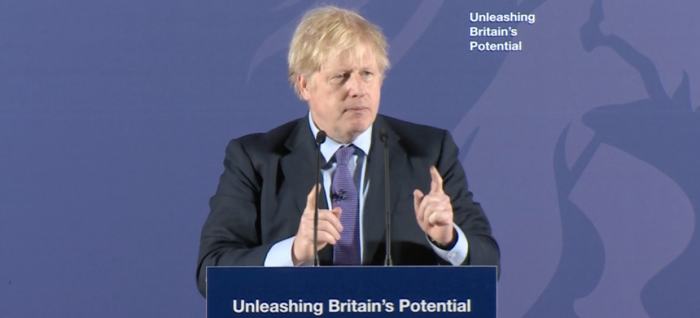Boris Johnson has insisted the UK will not ‘engage in some cut-throat race to the bottom’ when it comes to post-Brexit trade deals.
But as he set out his plans to ‘unleash Britain’s potential’, the Prime Minister described the concerns over standards as ‘hysterical’ and questioned whether US standards are ‘inferior’.
Speaking at Greenwich, in London, Mr Johnson made it clear his preferred option for our future EU relationship is for a free trade deal of the sort Canada recently negotiated with the EU. The Canada-EU deal eliminates most tariffs on goods, although some remain on sensitive poultry and meat products.
Such an arrangement would, according to Mr Johnson, mean there is no need to follow EU rules. The Prime Minister made it clear he would rather move onto something closer to WTO trading terms than a closer, Norway-style deal with the EU if this could not be achieved.
“We have often been told that we must choose between full access to the EU market, along with accepting its rules and courts on the Norway model, or an ambitious free trade agreement, which opens up markets and avoids the full panoply of EU regulation, on the example of Canada,” he said.
“We have made our choice – we want a free trade agreement, similar to Canada’s but in the very unlikely event that we do not succeed, then our trade will have to be based on our existing Withdrawal Agreement with the EU.”
“The choice is emphatically not ‘deal or no deal’. The question is whether we agree a trading relationship with the EU comparable to Canada’s – or more like Australia’s. In either case, I have no doubt that Britain will prosper mightily.”
Mr Johnson’s speech also addressed the issue of standards. He insisted the Government would ‘not engage in some cut-throat race to the bottom’ and that the UK will ‘maintain the highest standards, better, in many respects, than those of the EU’ in areas such as the environment.
But beyond the set piece speech, Mr Johnson called for an end to ‘hysterical’ fears about US food coming to the UK as part of a post-Brexit trade deal in comments that will not exactly reassure the food and farming industry.
While reiterating that the UK would not accept a ‘diminution of standards’ on food hygiene or animal welfare in a future US deal, he said Britain would be ‘governed by science, not mumbo-jumbo’ when looking at whether imported food was acceptable for consumption in the UK. He criticised ‘America bashers’ who take a ‘hysterical’ attitude towards US food and view it as inferior’, the Guardian reported.
Brussels stance
But in a speech in Brussels, Michel Barnier, the EU’s chief negotiator highlighted battleground ahead over rules and regulations. He said the EU was ready to offer a ‘highly ambitious trade deal as the central pillar of this partnership’, which included zero tariffs and zero quotas, but said this was dependent on the UK agreeing to ‘specific and effective guarantees to ensure a level playing field’ so competition ‘is and remains open and fair’.
Mr Barnier said all goods coming into the EU will need to comply with its rules on health or other standards and ‘will be subject to regulatory checks’.
“Will the UK continue to adhere to Europe’s societal and regulatory model in the future or will it seek to diverge? The UK’s answer to this question will be fundamental,” he said.
Industry reaction
Responding to Mr Johnson’s, CLA President Mark Bridgeman said: “The EU sells £33bn of agricultural products to the UK each year – almost £20bn more than we sell to them – so the Prime Minister is absolutely right to have confidence in the value of our market.
“But make no mistake, without a decent free trade agreement thousands of farmers both in the UK and the EU would be at risk of going out of business, with all the devastation to lives and communities that go with it.
“We understand a degree of posturing is inevitable, but no one – on either side of the negotiating table – should forget what is at risk.”
Industry position on standards
At the end of January, a coalition of 62 farming, environmental, animal welfare and public health organisations, including the NPA, called for the Government to enshrine its commitment to protect post-Brexit UK farm standards in future trade deals in law.
The organisations, mobilised by the NFU, said they supported the Government’s stated commitment to ‘ensuring the environmental, animal welfare and safety standards of UK food production are not undermined after we leave the EU and develop our own independent trade policy’.
But they stressed that the issue is complex and that they need more than ‘ust verbal assurances to ensure our standards are properly safeguarded’.
They called for various specific actions, including enshrining its manifesto commitment in law via the Agriculture Bill and establishing a trade and standards commission, bringing together a wide variety of stakeholders to engage on the UK’s trade policy and how it affects our standards.
The drive will be reinforced with a Westminster rally, scheduled for March 25, bringing together hundreds of farmers from across the country to urge the Government to take decisive action on the issue.
“Failure to do so risks undermining British food production and our own domestic farming industry,” said NFU president Minette Batters, who challenged Conservative Party co-chairman James Cleverly on the issue when she appeared on BBC Question Time on January 30.
Like many ministers before him, he was unable to provide any answers or reassurance.




